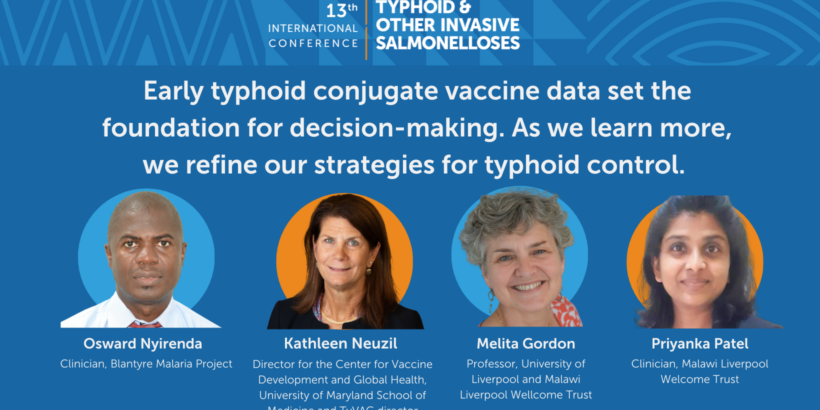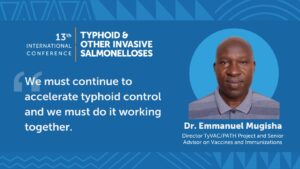As the 13th International Conference on Typhoid & Other Invasive Salmonelloses, kicks off today in Kigali, Rwanda, we are excited to learn about new typhoid research, hear about advances in typhoid conjugate vaccine (TCV) introduction, and to collaborate and learn from our colleagues across the world. The conference, which convenes every two years, will focus on Catalyzing Change: The Urgency of Expanding Impact-Driven Solutions. The timing of the conference is crucial as the urgent need for typhoid prevention and control grows.
The Take on Typhoid team is attending the conference to share data, information, lessons learned, and future goals, and to ensure that relevant information is disseminated to policymakers working to prioritize health goals in their countries. Take on Typhoid is a partnership between the Coalition against Typhoid (CaT) and the Typhoid Vaccine Acceleration Consortium (TyVAC). We work to prioritize an integrated approach to prevent and control typhoid, which includes TCV and improved water, sanitation, and hygiene interventions.
While great progress has been made to prevent and control typhoid, it remains a serious global health challenge with millions infected each year. As Dr. Emmanuel Mugisha, director of the TyVAC/PATH project notes, “We must continue to accelerate typhoid control and we must do it working together.” The three-day conference will cover an array of important topics related to typhoid prevention and control. This includes the need for surveillance data and ongoing typhoid research to continue to expand what we already know about typhoid burden; improvements in WASH interventions; as well as prevention of drug resistant typhoid. Dr. Kathleen Neuzil, Director for the Center for Vaccine Development and Global Health, University of Maryland School of Medicine and TyVAC director, noted that “Early TCV data set the foundation for decision-making. As we learn more, we refine our strategies for typhoid control.”
The conference will also discuss these strategies, including the significant role of TCVs to prevent disease, and will highlight the experience from Malawi’s recent integrated TCV campaign. This week we will learn more about long-term efficacy data, the use of TCVs to protect against drug-resistant strains, health economic data, and more.
As the conference begins today, we look forward to collaboration with partners and stakeholders, hearing from field experts, and establishing future goals that work to reduce the global burden of typhoid. For those joining in Kigali, we look forward to meeting you in person; for those not in Kigali, please follow our social media channels for live updates! Here’s to a strategic, collaborative, and informative three days ahead!




